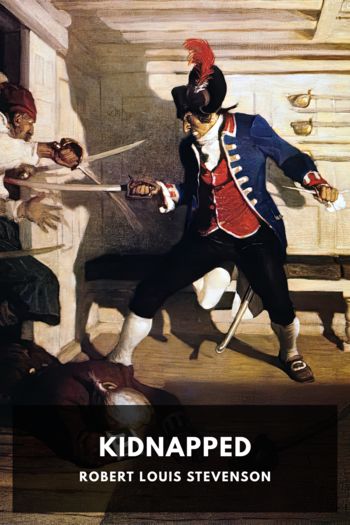Catriona, Robert Louis Stevenson [the gingerbread man read aloud txt] 📗

- Author: Robert Louis Stevenson
Book online «Catriona, Robert Louis Stevenson [the gingerbread man read aloud txt] 📗». Author Robert Louis Stevenson
As for James, he paid not so much heed to us, or to anything in nature but his pocket, and his belly, and his own prating talk. Before twelve hours were gone he had raised a small loan of me; before thirty, he had asked for a second and been refused. Money and refusal he took with the same kind of high good-nature. Indeed, he had an outside air of magnanimity that was very well fitted to impose upon a daughter; and the light in which he was constantly presented in his talk, and the man’s fine presence and great ways went together pretty harmoniously. So that a man that had no business with him, and either very little penetration or a furious deal of prejudice, might almost have been taken in. To me, after my first two interviews, he was as plain as print; I saw him to be perfectly selfish, with a perfect innocency in the same; and I would harken to his swaggering talk (of arms, and “an old soldier,” and “a poor Highland gentleman,” and “the strength of my country and my friends”) as I might to the babbling of a parrot.
The odd thing was that I fancy he believed some part of it himself, or did at times; I think he was so false all through that he scarce knew when he was lying; and for one thing, his moments of dejection must have been wholly genuine. There were times when he would be the most silent, affectionate, clinging creature possible, holding Catriona’s hand like a big baby, and begging of me not to leave if I had any love to him; of which, indeed, I had none, but all the more to his daughter. He would press and indeed beseech us to entertain him with our talk, a thing very difficult in the state of our relations; and again break forth in pitiable regrets for his own land and friends, or into Gaelic singing.
“This is one of the melancholy airs of my native land,” he would say. “You may think it strange to see a soldier weep, and indeed it is to make a near friend of you,” says he. “But the notes of this singing are in my blood, and the words come out of my heart. And when I mind upon my red mountains and the wild birds calling there, and the brave streams of water running down, I would scarce think shame to weep before my enemies.” Then he would sing again, and translate to me pieces of the song, with a great deal of boggling and much expressed contempt against the English language. “It says here,” he would say, “that the sun is gone down, and the battle is at an end, and the brave chiefs are defeated. And it tells here how the stars see them fleeing into strange countries or lying dead on the red mountain; and they will never more shout the call of battle or wash their feet in the streams of the valley. But if you had only some of this language, you would weep also because the words of it are beyond all expression, and it is mere mockery to tell you it in English.”
Well, I thought there was a good deal of mockery in the business, one way and another; and yet, there was some feeling too, for which I hated him, I think, the worst of all. And it used to cut me to the quick to see Catriona so much concerned for the old rogue, and weeping herself to see him weep, when I was sure one-half of his distress flowed from his last night’s drinking in some tavern. There were times when I was tempted to lend him a round sum, and see the last of him for good; but this would have been to see the last of Catriona as well, for which I was scarcely so prepared; and besides, it went against my conscience to squander my good money on one who was so little of a husband.
XXVII A TwosomeI believe it was about the fifth day, and I know at least that James was in one of his fits of gloom, when I received three letters. The first was from Alan, offering to visit me in Leyden; the other two were out of Scotland and prompted by the same affair, which was the death of my uncle and my own complete accession to my rights. Rankeillor’s was, of course, wholly in the business view; Miss Grant’s was like herself, a little more witty than wise, full of blame to me for not having written (though how was I to write with such intelligence?) and of rallying talk about Catriona, which it cut me to the quick to read in her very presence.
For it was of course in my own rooms that I found them, when I came to dinner, so that I was surprised out of my news in the very first moment of reading it. This made a welcome diversion





Comments (0)